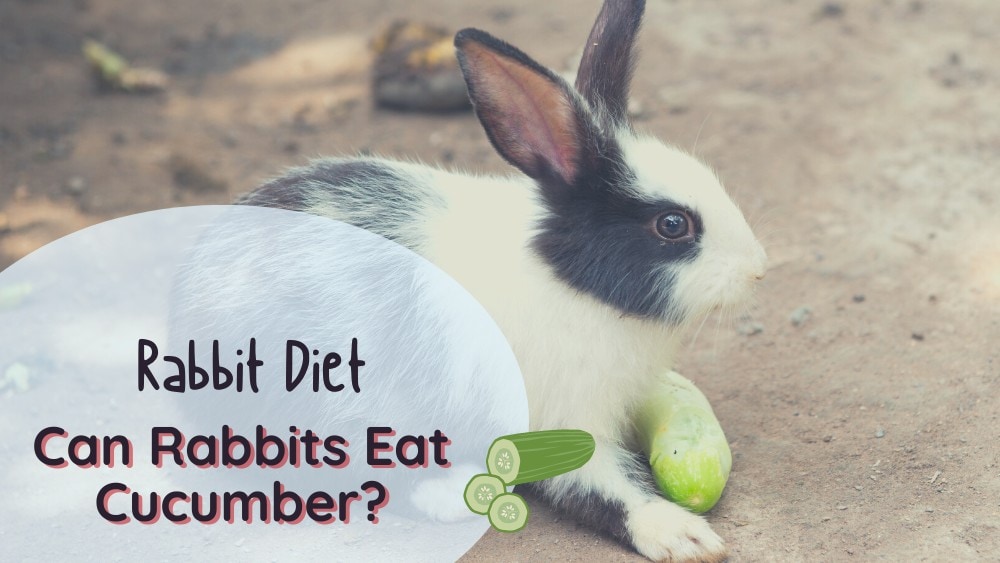Cucumbers are a popular fruit. Yes, they’re technically a fruit, not a vegetable! They’re tasty and refreshing and a great addition to a salad. They also have health benefits, including increasing hydration, improving bone and cardiovascular health, and reducing inflammation!
With all these benefits, you might wonder, can rabbits eat cucumber? The answer is yes! My rabbit used to love a bit of cucumber, even in his old age. But there’s more to it than that.
This article will cover the following:
- The health benefits of cucumber
- Which parts of a cucumber your rabbit can eat
- How much to feed them
- How to prepare your rabbit’s cucumber
- Whether baby rabbits can have cucumber
- Some tasty alternatives
Can Rabbits Eat Cucumber?
Yes, rabbits can eat cucumber. Most bunnies enjoy the taste. It’s non-toxic and makes an excellent treat for bunnies in moderation. It even has several health benefits for rabbits, including being very hydrating.
Health Benefits of Cucumber
Cucumbers aren’t just tasty for your bunny. They also have some potential benefits for their health.
Hydration
Since cucumbers contain 95% water, they’re very hydrating for your furry friend. You can use them to boost your bunny’s hydration if the weather is hot or your rabbit is sick.
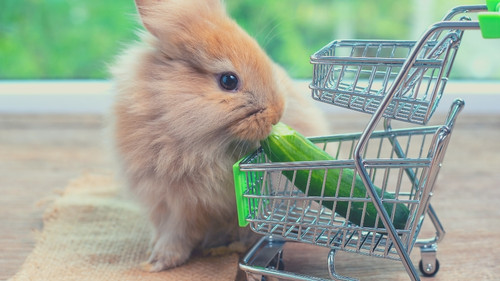
When my rabbit Hopkins was very unwell in his later life, cucumbers were one of the main ways I could get some water into him.
Low Calorie
This interesting fruit is very low in calories. This makes it a healthy treat for overweight rabbits or those on a low-calorie diet. If you’re training your bunny, you could cut up cucumber into small pieces to use as low-calorie training treats.
Vitamins and Minerals
Cucumbers contain important nutrients like vitamins C and K. These vitamins help a rabbit grow properly and keep their bones strong. They promote good health and reduce the risk of health issues.
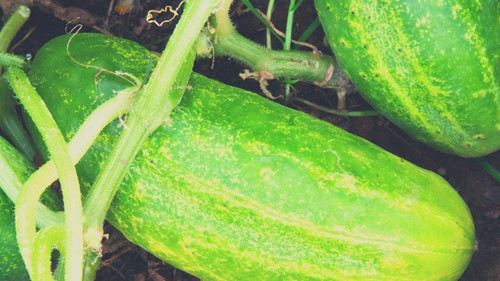
Fiber
Fiber is a crucial part of a rabbit’s diet. It helps them wear down their teeth and keep their digestive system functioning properly. The skin of the cucumber is high in fiber. However, since cucumbers are mostly water and have little skin, they aren’t as high in fiber as other sources.
Which Parts of the Cucumber Can Your Rabbit Eat?

Cucumbers have multiple parts, including the skin, the leaves, the seeds, and the flowers. Let’s take a look and see what’s safe for your rabbit to munch on.
Can Rabbits Eat Cucumber Skin?
Yes, rabbits can eat cucumber skin. As we discussed above, cucumber skin is high in fiber, so it’s good for your rabbit when given in small portions.
Can Rabbits Eat Cucumber Leaves?
Rabbits can eat cucumber leaves. They’re low in oxalic acid, so they’re safe for your bunny.
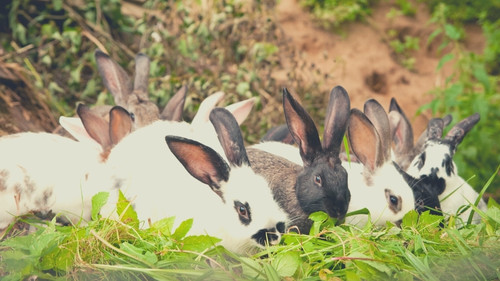
The House Rabbit Society explains that oxalic acid is a type of naturally occurring chemical which is harmless in small amounts. However, large doses can cause health issues like kidney damage over time.
This means you should only feed your rabbit small amounts of cucumber leaves.
Can Rabbits Eat Cucumber Seeds?
The seeds of a cucumber are one of the most nutritious parts of the fruit. Since the seeds are soft and small, they don’t pose a choking hazard to bunnies. Your rabbit can eat cucumber seeds safely.
Can Rabbits Eat Cucumber Flowers?
That’s right; cucumbers have flowers attached to them as they grow! They’re bright yellow and soft in texture.
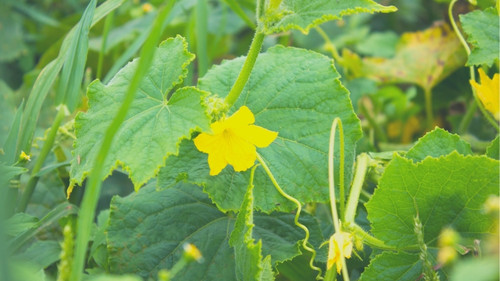
The blossoms are safe for your rabbit to eat, and many rabbits love the taste. You can even sprinkle them amongst their hay to make their meals more exciting.
How Much Cucumber Should You Give Your Rabbit?
A rabbit’s diet should consist of 85% hay, 10% greens, and 5% good-quality pellets. You can offer some fruits like cucumber, but only now and then.
You must only give your rabbit a small amount of cucumber. Don’t feed your rabbit cucumber every day. Two or three slices a week is plenty. Any more than this can come with some risks, which are discussed below.
Low Nutritional Value
Since cucumber is full of water, it has a low nutritional value. It’s important not to offer too much cucumber, especially in place of other foods.
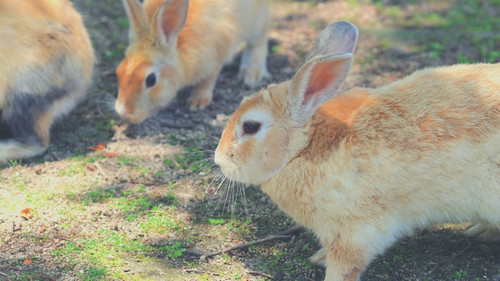
You shouldn’t rely on it to add nutrients to your rabbit’s diet. This could cause malnutrition. Instead, you should use it as a treat.
Digestive Issues
We know that cucumber has a high water content and is great for hydration. However, if you give your bunny too much cucumber, the high water levels can lead to digestive issues.
It can cause diarrhea, which can be very dangerous for a rabbit. You might also find it causes excess gas and makes your rabbit uncomfortable.
Soft Cecotropes
Cecotropes are types of droppings that contain partially digested food particles. Rabbits eat them to get more vitamins and minerals out of their food. Yes, I did say they eat their own poop! It doesn’t sound very nice, but it’s a crucial part of a rabbit’s digestive system.
The cecotropes contain lots of essential nutrients like vitamin B. Without eating these droppings, your bunny wouldn’t get the fuel they need to stay healthy.
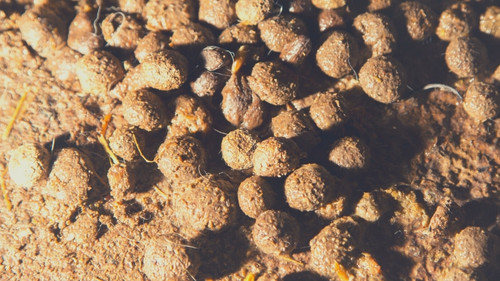
The high water content in cucumbers can result in loose cecotropes. This makes them more challenging for your rabbit to eat and digest. In turn, this means they don’t get those all-important nutrients.
How to Prepare Your Rabbit’s Cucumber
Always give your rabbit fresh cucumber. You should never offer pickles as they’re not good for your bunny.
It’s best to buy organic cucumber for your rabbit, if you can, to reduce the number of pesticides on the fruit. Whichever cucumber you choose, wash it thoroughly with water to remove dirt, germs, and any pesticide residue.
Cut your rabbit’s cucumber into slices. Remember we talked about only giving a bunny two or three slices of cucumber a week? You can always cut these up into smaller, bite-sized sections to make them last longer. This is particularly helpful if you’re using them for training.
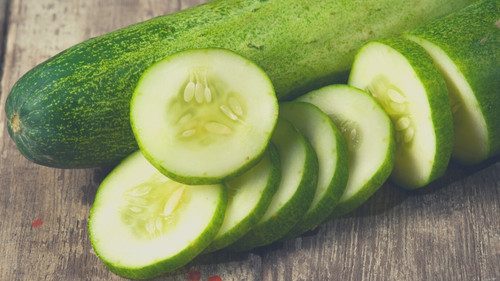
If it’s the first time your furbaby is trying cucumber, it’s important to introduce it into their diet slowly.
Offer them one slice at the most and then wait a few days to see how their digestive system reacts. If there’s no adverse reaction, you can go ahead and add cucumber to your rabbit’s diet as an occasional treat.
Can Baby Rabbits Eat Cucumber?
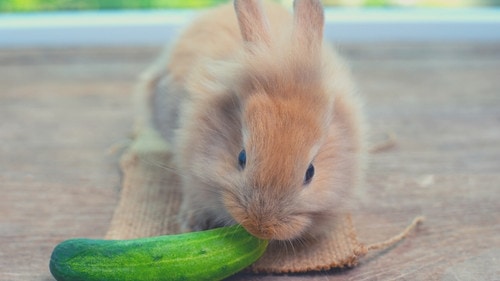
Baby rabbits are known as kittens or kits. Kits shouldn’t have cucumber until they’re over three months old. Before this, they should only consume their mother’s milk and water. At this young age, they can’t digest fruits or vegetables.
When they’re a few weeks old, kits can start nibbling hay. They can start eating pellets and having hay regularly at seven weeks old. At 12 weeks old, you can introduce vegetables and fruits very slowly. It’s best to do this one at a time so their digestive system can adjust gradually.
Alternatives to Cucumber
There is a wide range of other fruits and vegetables you can feed your rabbit in addition to cucumber. Some of my favorites to feed rabbits include:
- Bell peppers
- Broccoli
- Cabbage (dark green varieties)
- Carrot tops
- Cauliflower
- Salad leaves
- Spinach
- Bananas
- Strawberries
- Apples
Before you feed your rabbit any new fruit or vegetable, it’s best to do your research. This way, you know how to prepare them and how much you can feed your bunny.
Conclusion
Rabbits can eat cucumber as long as you offer it in moderation alongside a healthy diet. They’re an excellent treat in warmer weather to keep your rabbit hydrated.
If you have any questions about your rabbit’s diet, you can leave them in the comment section below. Have you tried giving your bunny cucumber?
References
Megan Ware, RDN, L.D., (2019), Health benefits of cucumber. Medical News Today.
WebMD, (2020), Foods High in Water.
Lebas, F. (2000). Vitamins in rabbit nutrition: Literature review and recommendations. World rabbit science, 8(4), 185-192.
House Rabbit Society, (2022), Best Vegetables and Fruits for Rabbits.
Rabbit Welfare Association and Fund, (2022), Rabbit Diet.
Rabbit Welfare Association and Fund, (2022), Digestion.
House Rabbit Society, (2022), Food & Diet.


